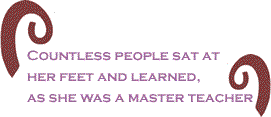|
To
the insistence of Clara Luper, from the state of Oklahoma, on a cool fall morning, I sat and listen at breakfast to
her tell me why she thought people from everywhere needed
to get involved in human rights somewhere, whatever the
location.  She
spoke in depth of her love, devotion and commitment, as
she placed, it to “the National Association for the Advancement
of Colored People (NAACP). She spoke to the reasons
as to why she had served as an advisor to so many young
people throughout the years and all of the good things they
were doing. Comically, as only an educator can do, she told
one of her young people to “never refer to the organization
as the N – double A C P. There is no such thing as double
A,” she admonished. She
spoke in depth of her love, devotion and commitment, as
she placed, it to “the National Association for the Advancement
of Colored People (NAACP). She spoke to the reasons
as to why she had served as an advisor to so many young
people throughout the years and all of the good things they
were doing. Comically, as only an educator can do, she told
one of her young people to “never refer to the organization
as the N – double A C P. There is no such thing as double
A,” she admonished.
Afterward,
I was given a tour of what was left of the Building that
was bombed by an American Citizen-turned-terrorist that
we came to know as Timothy McVeigh, and the park that was
dedicated as a memorial to the victims. She then took me
back to her home, followed by the Martin Luther King, Jr.
center where she also gave me a personal in-depth tour,
complete with her saying that civil and human rights was
a continuing movement! She repeatedly spoke of all her years,
which consisted of most of her life, spent fighting for
the least of God’s children for the greater good in every
arena that she could imagine. Fresh in my memory, as though
it occurred today, it happened more than a decade ago while
on my first visit to Oklahoma
City.
Like
many other people whose names we will never know, Clara
Luper is the personification of the pillars on which, I
maintain, we all have our foundation. She not only paved
the path but in the process of her journey set the example
that we have a responsibility to emulate. As I remember,
Ms. Luper spoke softly but carried a large stick while changing
the community around her and in doing so, changed the world
for the greater good of humanity.  Countless
people sat at her feet and learned, as she was a master
teacher. Countless
people sat at her feet and learned, as she was a master
teacher.
As
I remember Clara Luper, I am reminded of what the poet Sam
Walter Foss tried to convey rhetorically to the world when
he just simply requested to a higher power, “Let
me live in my house by the side of the road, where the races
of men go by- They are good, they are bad, they are weak,
they are strong, Wise, foolish - so am I. Then why should
I sit in the scorner's seat, or hurl the cynic's ban? Let
me live in my house by the side of the road, and be a friend
to man."
BlackCommentator.com Guest Commentator, The Reverend D. D. Prather, is a noted
Civil/Social Justice Activist, and a native
of Atlanta, GA. Click here
to contact the Reverend Prather.


|

